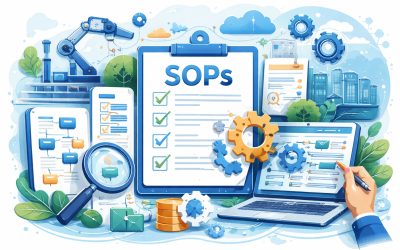Manufacturing Automation Integration Guide
The manufacturing landscape is rapidly evolving, with companies increasingly turning to automation to stay competitive. Manufacturing automation integration has become essential for businesses seeking to improve efficiency, reduce costs, and maintain quality standards in today’s demanding market.
Key Benefits of Manufacturing Automation Integration
Modern manufacturing automation delivers transformative results across multiple operational areas. Companies typically see immediate improvements in production speed, with automated systems capable of operating 24/7 without breaks or shift changes. Quality consistency becomes dramatically more reliable, as automated processes eliminate human error and maintain precise specifications throughout production runs.
Cost reduction represents another significant advantage. While initial investment may seem substantial, automation typically pays for itself within 12-18 months through reduced labor costs, decreased waste, and improved throughput. Additionally, automated systems generate valuable data that enables predictive maintenance, further reducing unexpected downtime and repair costs.
Best Practices
Successful automation implementation requires careful planning and strategic execution. Start by conducting a comprehensive assessment of your current processes to identify the most suitable candidates for automation. Not every task benefits from automation – focus on repetitive, high-volume operations where consistency and speed matter most.
Phased implementation proves more effective than attempting to automate entire production lines simultaneously. Begin with pilot projects that demonstrate clear ROI, then gradually expand automation throughout your facility. This approach allows your team to adapt to new technologies while building internal expertise.
Overcoming Manufacturing Automation Integration Challenges
Employee training and change management represent critical success factors often overlooked during planning phases. Workers need proper training on new systems, and companies must clearly communicate how automation enhances rather than replaces human capabilities. Creating cross-functional teams that include both technical and operational staff ensures smoother transitions.
Integration with existing ERP systems requires careful coordination to maintain data accuracy and workflow continuity. Work with experienced automation partners who understand your industry’s specific requirements and can customize solutions accordingly.
Manufacturing automation integration offers tremendous potential for operational improvement, but success depends on strategic planning, proper implementation, and ongoing optimization. Companies that approach automation thoughtfully position themselves for sustained competitive advantage in an increasingly automated manufacturing environment.
Ready to explore how manufacturing automation integration can transform your operations? Contact TSVMap today for a comprehensive manufacturing assessment and discover which automation solutions deliver the best ROI for your specific production environment.
![]() TSVMap is committed to enhancing your manufacturing processes and providing expert consultation on your IT solutions, striving to maximize their effectiveness and efficiency. If you require assistance with…IT Solutions, Assessment, Consultants, ERP Systems, MRP Systems, Automations, or Cyber Security. Contact us today at 864-991-5656 or Email info@tsvmap.com.
TSVMap is committed to enhancing your manufacturing processes and providing expert consultation on your IT solutions, striving to maximize their effectiveness and efficiency. If you require assistance with…IT Solutions, Assessment, Consultants, ERP Systems, MRP Systems, Automations, or Cyber Security. Contact us today at 864-991-5656 or Email info@tsvmap.com.









0 Comments